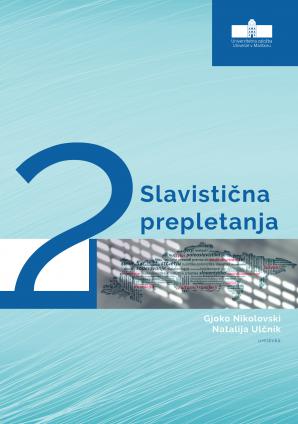Slavistična prepletanja 2
Keywords:
Slavic literature, interculturality, literary translation, adaptation of literary work, intermedialitySynopsis
The scientific monograph Slavic Intertwining 2 includes seventeen papers in the field of research into Slavic literature and translation contacts between Slavic languages, as well as interdisciplinary research into Slavic literature. The monograph opens with a set of contributions that deal with Slavic literature through the prism of interculturality, while the translations of Slavic literature as cultural transfers are the focus of the contributions of the second set. The third part of the monograph focuses on research into older periods of Slavic literature, and the monograph is closed by contributions from the field of literary and artistic intermediality and film adaptations of Slavic literature. Intercultural and translation research of Slavic literature, research of older periods of Slavic literature and adaptations of Slavic literature are just some of the research challenges of Slavic literary research, which are relevant both in terms of research topics and methodologies.
Downloads

Downloads
- Tri tipa ekranizacije književnih djela na primjeru ukrajinske književnosti Tri tipa ekranizacije književnih djela na primjeru ukrajinske književnosti
- Time of the Story and Time of the Text in A Neo-Historical and Dystopian Novel Time of the Story and Time of the Text in A Neo-Historical and Dystopian Novel
- Medmedialnost na primeru poljske zbirke kratkih zgodb, televizijske serije in videoigre Poslednja želja (The Witcher) Medmedialnost na primeru poljske zbirke kratkih zgodb, televizijske serije in videoigre Poslednja želja (The Witcher)
- Autor u filmskoj adaptaciji romana Seobe Miloša Crnjanskog Autor u filmskoj adaptaciji romana Seobe Miloša Crnjanskog
- Slovenska književnost v medkulturnem kontekstu Slovenska književnost v medkulturnem kontekstu
- Desetnice in desetniki v Simčičevem romanu Poslednji deseti bratje Desetnice in desetniki v Simčičevem romanu Poslednji deseti bratje
- Kombinacija medijev in medmedialne relacije kot obliki literarno-likovne medmedialnosti v treh zbirkah Cankarjeve kratke proze Kombinacija medijev in medmedialne relacije kot obliki literarno-likovne medmedialnosti v treh zbirkah Cankarjeve kratke proze
- Ратко и Мирко и уште неколку лексички особености на преводот на збирката раскази „Викајте ме Естебан“ од Лејла Каламуиќ од босански на македонски јазик Ратко и Мирко и уште неколку лексички особености на преводот на збирката раскази „Викајте ме Естебан“ од Лејла Каламуиќ од босански на македонски јазик
- “Šta je bre kume, opet si doručkovao kerozin?” Polysemy in Subtitling “Šta je bre kume, opet si doručkovao kerozin?” Polysemy in Subtitling
- Slovenska posvetna strokovna literatura 18. stoletja: študija primera Slovenska posvetna strokovna literatura 18. stoletja: študija primera
- Narava v izbrani Aškerčevi poeziji do leta 1900 Narava v izbrani Aškerčevi poeziji do leta 1900
- Vpliv tujih mestnih središč na oblikovanje slovenske meščanske oblačilne identitete na primeru Stritarjevega romana Sódnikovi Vpliv tujih mestnih središč na oblikovanje slovenske meščanske oblačilne identitete na primeru Stritarjevega romana Sódnikovi
- Projekcije ilirstva u pjesništvu hrvatskoga narodnog preporoda: između mita i utopije Projekcije ilirstva u pjesništvu hrvatskoga narodnog preporoda: između mita i utopije
- Pregled raziskovalne problematike pri analizi slovenskih prevodov poljskih klasičnih romanov Pregled raziskovalne problematike pri analizi slovenskih prevodov poljskih klasičnih romanov
- Передача единиц шотландского диалекта в переводах Роберта Бернса на русский и словенский языки Передача единиц шотландского диалекта в переводах Роберта Бернса на русский и словенский языки
- Poetika dislokácie: slovinská literatúra v slovenskej kultúre po roku 1989 Poetika dislokácie: slovinská literatúra v slovenskej kultúre po roku 1989






